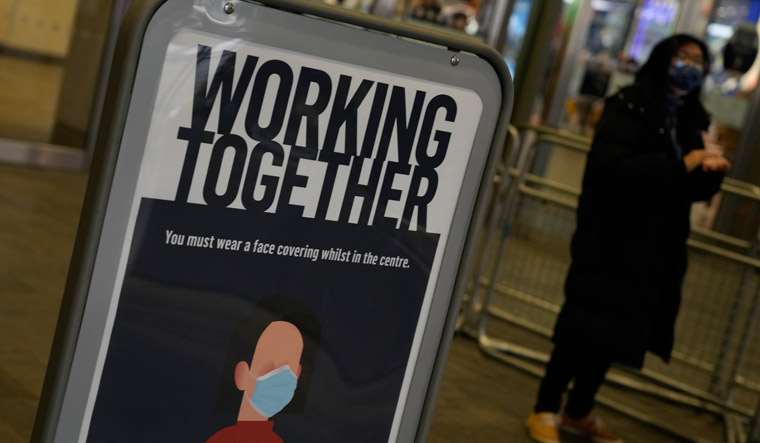People from a South Asian heritage, including Indians, are among the ethnic groups more at risk of catching and being seriously affected by COVID-19, a new UK government commissioned review concluded on Friday.
The COVID-19 Health Inequalities' study found that people from black and South Asian ethnic groups in Britain are still dying with the coronavirus at higher rates than those of white ethnicity, with vaccination rates, occupation and household size and make up among the factors behind the disparity.
The updated analysis confirms previously reported figures that people from Black African, Black Caribbean, Bangladeshi and Pakistani ethnic backgrounds were at a greater risk of death from COVID-19, than the white British group.
"In the first two waves, the higher death rate seen in ethnic minorities was primarily due to their higher risk of infection compared to whites particularly in older age groups, notes Dr Raghib Ali, Senior Clinical Research Associate, University of Cambridge and Consultant Acute Medicine, Oxford University Hospitals, appointed the British government's independent adviser on COVID-19 and ethnicity.
In the third wave, however, we are seeing lower infection rates in ethnic minorities than in white people, but rates of hospital admissions and deaths are still higher with the pattern now matching levels of vaccine uptake in higher risk groups. Although vaccine uptake in all ethnic minorities has increased very significantly over the last year, the proportion unvaccinated is twice as high in South Asian people and four times as high in black people, he pointed out.
Ali used the latest review to highlight that it is another reminder that the vaccines are the best protection, especially if you live in a multi-generational household as South Asians in Britain tend to do. He also urged people to take up the booster vaccines to top up immunity, currently being offered in the UK.
And it is never too late to come and take your first dose. The booster doses are also really important to maximise your protection and reduce your risk as the immunity is now waning," he added.
The final report into Covid-19 disparities sets out how government research identified the key virus risk factors such as occupation, household size and wider living circumstances for specific groups and used that data to provide targeted, evidence-based guidance and advice on how to reduce the risk of infection.
We know that COVID-19 has had a disproportionate impact on ethnic minorities and this report helps us further understand the reasons why, said UK Minister for Vaccines and Public Health Minister for Vaccines and Public Health Maggie Throup.
The vaccine is our best defence against this virus and our phenomenal vaccine campaign has saved thousands of lives. You can still get your first vaccine, second dose and if eligible, the booster jab to secure vital protection for yourself and your loved ones, she said.
The research found that vaccination has sharply reduced COVID-19 death rates for people of all ethnicities. Overall, British Indians tend to reflect positive uptakes of vaccination and at least 70 per cent of people from the Indian, Mixed White and Asian and Asian Other groups rated the communications around the rollout as very or quite good.
Our understanding of how Covid-19 affects different ethnic groups has transformed since the pandemic began, said UK Minister for Equalities Kemi Badenoch.
"We know now that factors like the job someone does, where they live, and how many people they live with, impacts how susceptible they are to the virus and it's imperative that those more at risk get their booster vaccine or their first and second dose if they are yet to have them. These insights from the award-winning Race Disparity Unit have informed every action we have taken to tackle disparities, not least through our history-making vaccination campaign, she said.
The government said all recommendations in the latest report, such as addressing specific ethnic minority groups, rather than referring to 'BAME' black, Asian and minority ethnic, and applying lessons from the COVID-19 vaccination deployment to future programmes, have been accepted.
Professor Kevin Fenton, London Regional Director for the Office of Health Improvement & Disparities (OHID), added: Health disparities are not new but they can be reduced. As we have passed through different waves of the pandemic, we have seen repeatedly that working with communities, rebuilding trust and confidence in services, tackling vaccine hesitancy, and addressing myths and misinformation head on, all help reduce the devastating impact of the virus.
Today, the vaccine remains the most effective measure to protect ourselves and our loved ones from the risks of COVID-19.
Clarity in communication around the vaccination programme, reassuring pregnant women about the safety of COVID vaccines and building trust with all ethnic groups are among the recommendations of the latest study, which the UK government said will be adopted in full.





